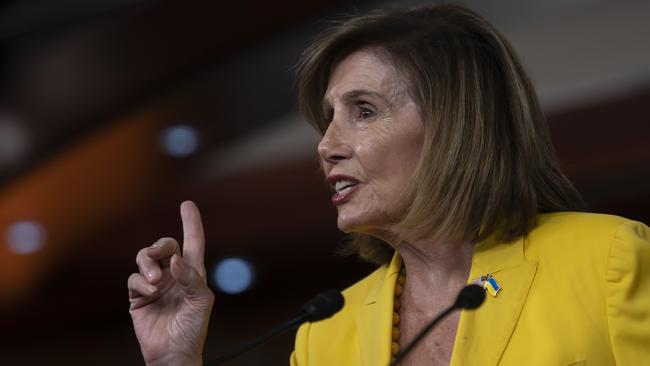Possible Nancy Pelosi Taiwan trip unsettles China and White House
Top Pentagon commanders briefed House Speaker about regional security as Beijing warns of severe consequences.

A possible trip to Taiwan by US House of Representatives Speaker Nancy Pelosi is jangling nerves in the Biden administration after China warned the visit would trigger severe consequences.
The White House hasn’t asked Ms Pelosi to forgo the trip, which hasn’t been officially announced, in deference to the separation of powers, according to officials.
Joint Chiefs of Staff chairman Mark Milley and John Aquilino, the head of the Indo-Pacific command, briefed Ms Pelosi on Capitol Hill on Wednesday, with White House staff present.
President Joe Biden told reporters that day, in reference to a possible Taiwan trip, that “the military thinks it’s not a good idea right now”.
Should it happen, the trip risks upsetting tentative efforts by Washington and Beijing to steady relations after years of worsening tensions. Some officials and foreign-policy specialists said Ms Pelosi’s trip could prompt China to step up military action around the island and in the strategic Taiwan Strait, offering up a warning to the US and the Taiwanese government to avoid upsetting Beijing.
Asked on Thursday about a Taiwan visit, Ms Pelosi declined to discuss her travel plans, citing security, and the California Democrat sidestepped why Mr Biden said the military had concerns about a trip.
“I think what the President was saying is the … maybe the military was afraid our plane would get shot down or something like that by the Chinese,” she said. “I don’t know exactly.”
Ms Pelosi said Mr Biden hadn’t discussed it with her.
China hasn’t issued specific threats about any retaliation in communications with US officials. Administration officials declined to provide details on the briefing of Ms Pelosi other than to say it covered regional security and logistics for a possible trip.
“It’s routine for the national security team to provide context, facts and geopolitically relevant information to the Speaker whenever she travels overseas. That’s just common practice,” said John Kirby, the National Security Council co-ordinator for strategic communications.
“But the Speaker makes her own decisions about travel.”
Beijing has warned that a visit by Ms Pelosi, the second in line to the President, would necessitate a response.
Taiwan has long been the third rail in US-China relations. Beijing claims the island as Chinese territory and sees its integration as a national objective. The US has been Taiwan’s chief partner and protector since it split from Beijing during the Chinese Civil War.
Ms Pelosi had been due to make a Taiwan trip in April, though it was scrubbed when she contracted Covid-19. About that time, an influential Chinese commentator and retired state media editor, Hu Xijin, suggested that China’s military intercept Ms Pelosi’s plane, an idea he repeated last week in a commentary.
Chinese scholars also have suggested to US counterparts that a visit would precipitate the worst crisis since a military standoff in the Taiwan Strait in 1995-96. On that occasion, which also centred on US support, China recalled its ambassador from Washington, staged regional military exercises and conducted ballistic missile tests near Taiwan’s two main commercial ports. The US sent aircraft carriers to the area, with both sides holding talks before standing down.
“For Beijing, the episode was viewed as a success, demonstrating again to the US that Taiwan is a war-or-peace issue that cannot be treated lightly,” John Culver, a senior fellow with the Atlantic Council who was a CIA analyst at the time of the crisis, tweeted last week. One difference now, Mr Culver noted, was that US-China relations were much worse than a quarter century ago.
While a Taiwan visit by Ms Pelosi doesn’t set a precedent – then-speaker Newt Gingrich, a Republican, travelled there in 1997 – Beijing sees a trip now as more provocative. Chinese leader Xi Jinping is in the midst of arranging a third, norm-breaking term as Communist Party chief at a political conference later this year and he can’t afford to give ammunition to critics by being seen as cowed by the US over an issue as fundamental as Taiwan.
Beijing already is concerned about what it sees as the US’s increasing military and political support for Taiwan, with more arms sales and visits by higher-ranking officials and members of Congress. That support, Chinese officials warn, violates commitments Washington has made to Beijing to maintain only unofficial ties with Taipei and bolsters resistance in Taiwan against an eventual unification with China.
“If Speaker Pelosi visits Taiwan,” Chinese Foreign Ministry spokesman Wang Wenbin said on Thursday, it would “seriously impact the political foundation of Sino-US relations and send a serious wrong signal to the ‘Taiwan independence’ separatist forces.”
Mr Wang further warned: “China will take effective measures to resolutely respond to and counter it, and we will do what we say.”
Washington is also wary of bowing to pressure from Beijing. The US is required by law to help Taiwan maintain an adequate defence. US officials have said that support for Taiwan has geared up in response to the threat posed by China’s build-up in military capabilities and its increasing willingness to send military aircraft and vessels near Taiwan to intimidate the Taiwanese government.
The Wall Street Journal



To join the conversation, please log in. Don't have an account? Register
Join the conversation, you are commenting as Logout